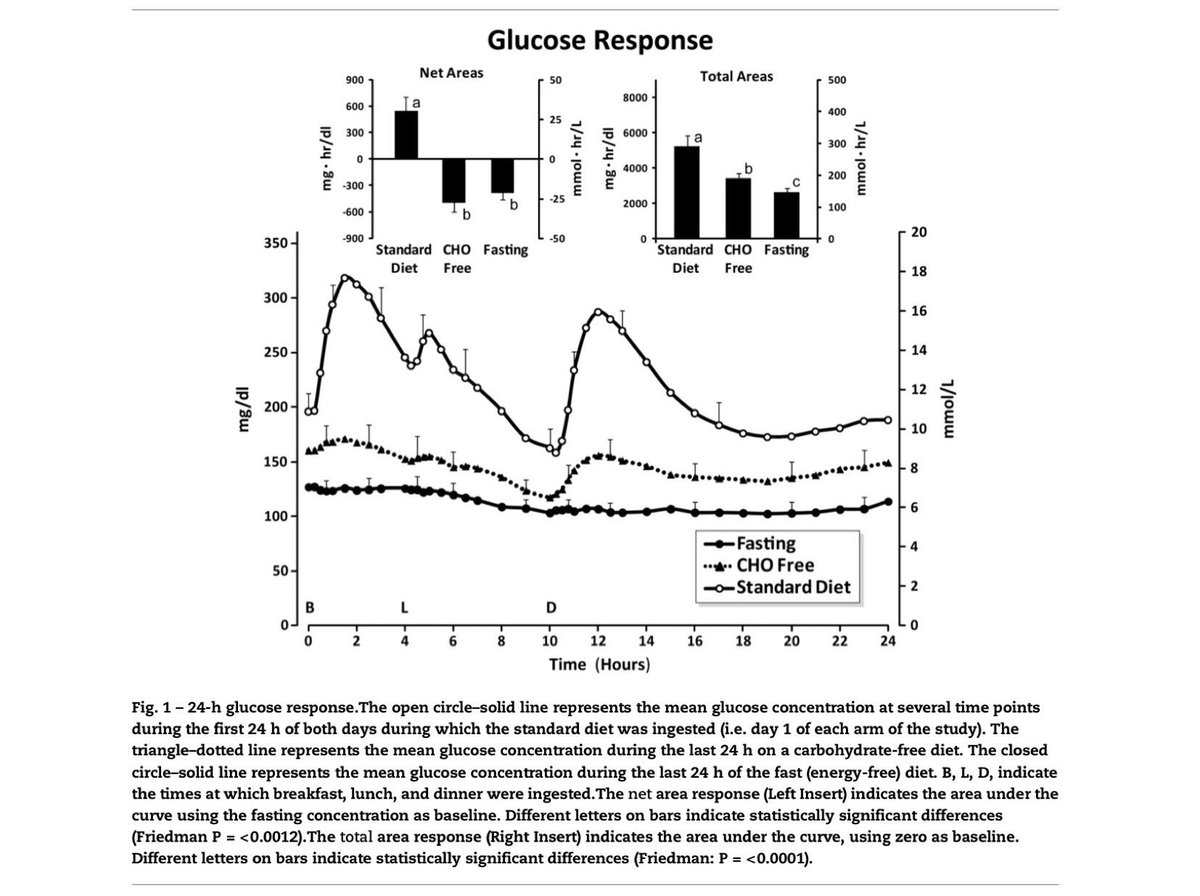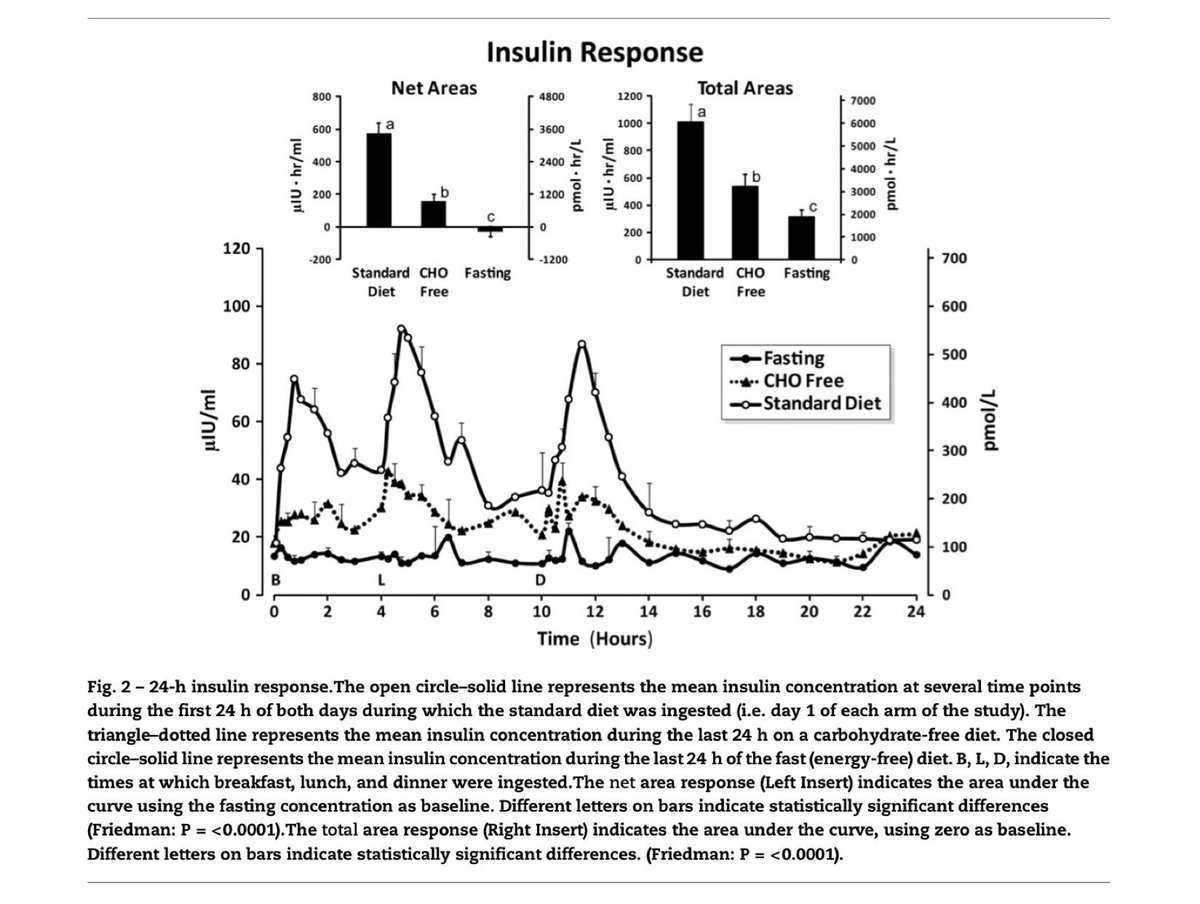Zero Carb vs Fasting

wabmester
Posts: 2,748 Member
This study is behind a pay wall, so all I've got is the abstract:
Comparison of a carbohydrate-free diet vs. fasting on plasma glucose, insulin and glucagon in type 2 diabetes
Short-term fasting dramatically lowered overnight fasting and 24 h integrated glucose concentrations. Carbohydrate restriction per se could account for 71% of the reduction. Insulin could not entirely explain the glucose responses. In the absence of carbohydrate, the net insulin response was 28% of the standard diet. Glucagon did not contribute to the metabolic adaptations observed.
My former doc just posted a couple graphs from this study, so we can get a little more insight.


Comparison of a carbohydrate-free diet vs. fasting on plasma glucose, insulin and glucagon in type 2 diabetes
Short-term fasting dramatically lowered overnight fasting and 24 h integrated glucose concentrations. Carbohydrate restriction per se could account for 71% of the reduction. Insulin could not entirely explain the glucose responses. In the absence of carbohydrate, the net insulin response was 28% of the standard diet. Glucagon did not contribute to the metabolic adaptations observed.
My former doc just posted a couple graphs from this study, so we can get a little more insight.


0
Replies
-
Assuming it's legitimately zero carb (as in, meat, fat, and water, and not "zero carb" which actually means "no sugar or starch, but vegetables are included"), that doesn't actually surprise me, though it's really cool to see it in black and white. I've found that even with only about 4 months of full compliance to carnivory (and even after a few months of reduced compliance), my bloodwork reflected a lot of the same changes that Dr. Fung sees with his extended fast patients, including what appears to be an insulin sensitivity "reset."
It's interesting to see that even the fasting sees insulin spikes around the same times as meals. I know gluconeogenesis is the driver of that at regular intervals (the same mechanism that produces the "dawn phenomenon"), but it's still interesting to see it corresponding with meal times.
It's also interesting to see the 24 hour amount has insulin going up to meet the level SAD goes down to.
Also, judging from the spikes on the zero carb, looks like they have bulletproof coffee for breakfast. 0
0 -
Hmm, I am going to read this entire study.
Macros for the CHO free diet were:
Fat: 82%
Protein: 15%
Carbs: < 3 %
Calories ranged from 2,025 to 3,900 (although it was probably somewhere in the middle of these two, because I am just using the low end of their calorie-by-weight with the lowest weight and the high end with the highest weight).
That means carbs ranged from 15.2 to 29.3 grams.
The study does not get into details about the specific foods and food types of the diet. At least not that I could see. I am going to have to read it in more detail.0 -
Glad to see studies like this!0
-
Hmm, I am going to read this entire study.
Macros for the CHO free diet were:
Fat: 82%
Protein: 15%
Carbs: < 3 %
Calories ranged from 2,025 to 3,900 (although it was probably somewhere in the middle of these two, because I am just using the low end of their calorie-by-weight with the lowest weight and the high end with the highest weight).
That means carbs ranged from 15.2 to 29.3 grams.
The study does not get into details about the specific foods and food types of the diet. At least not that I could see. I am going to have to read it in more detail.
Well, that's still arguably better than some so-called "no carb" diets used in studies that are basically just modified Atkins. I'll be interested to hear where these 15-30g are coming from, though.0 -
Dragonwolf wrote: »Hmm, I am going to read this entire study.
Macros for the CHO free diet were:
Fat: 82%
Protein: 15%
Carbs: < 3 %
Calories ranged from 2,025 to 3,900 (although it was probably somewhere in the middle of these two, because I am just using the low end of their calorie-by-weight with the lowest weight and the high end with the highest weight).
That means carbs ranged from 15.2 to 29.3 grams.
The study does not get into details about the specific foods and food types of the diet. At least not that I could see. I am going to have to read it in more detail.
Well, that's still arguably better than some so-called "no carb" diets used in studies that are basically just modified Atkins. I'll be interested to hear where these 15-30g are coming from, though.
I have the complete study. Doesn't say where the carbs come from.0 -
Dragonwolf wrote: »Hmm, I am going to read this entire study.
Macros for the CHO free diet were:
Fat: 82%
Protein: 15%
Carbs: < 3 %
Calories ranged from 2,025 to 3,900 (although it was probably somewhere in the middle of these two, because I am just using the low end of their calorie-by-weight with the lowest weight and the high end with the highest weight).
That means carbs ranged from 15.2 to 29.3 grams.
The study does not get into details about the specific foods and food types of the diet. At least not that I could see. I am going to have to read it in more detail.
Well, that's still arguably better than some so-called "no carb" diets used in studies that are basically just modified Atkins. I'll be interested to hear where these 15-30g are coming from, though.
I have the complete study. Doesn't say where the carbs come from.
Boo. 0
0 -
Very interesting. I'm going to look for the full study. I haven't had much luck with IF, which has dissuaded me from any further fasting.
I don't have dawn phenomenon, I have mid-morning phenomenon. My blood sugar spikes around 9-10 am every day whether I eat food, don't eat food, just have a BPC or just have a coffee with cream. However, it spikes the most when I eat nothing and the least when I eat food.
And when I've gone through until 5pm before I eat, I get a big spike in the mid afternoon, around when I would have eaten, and again, it's a bigger spike if I don't eat than if I do eat.
I guess this study explains the spikes, but it doesn't explain why they are higher when I don't eat than when I do eat. But with every study there are always outliers and not everyone falls within a single standard deviation.0 -
PaleoInScotland wrote: »Very interesting. I'm going to look for the full study. I haven't had much luck with IF, which has dissuaded me from any further fasting.
I don't have dawn phenomenon, I have mid-morning phenomenon. My blood sugar spikes around 9-10 am every day whether I eat food, don't eat food, just have a BPC or just have a coffee with cream. However, it spikes the most when I eat nothing and the least when I eat food.
And when I've gone through until 5pm before I eat, I get a big spike in the mid afternoon, around when I would have eaten, and again, it's a bigger spike if I don't eat than if I do eat.
I guess this study explains the spikes, but it doesn't explain why they are higher when I don't eat than when I do eat. But with every study there are always outliers and not everyone falls within a single standard deviation.
Exact same thing happens to me. Maybe the result of years of habit, like the body is programmed to react that way at that time? But since when we do eat, the food is HF and LC the reaction we get is to that food and is for that reason better than what the body was "programmed" to do?
I think it's getting better, I'm increasing the intervals without food and I can go up to 12h without problem. However, if I try to extend that period, around 14h to 16h fast I get serious lows (below 70) and I need to eat. Not only are hypos scary but they're also dangerous so I'm proceeding with great caution and measuring every attempt.
::flowerforyou::0 -
KetoGirl83 wrote: »PaleoInScotland wrote: »Very interesting. I'm going to look for the full study. I haven't had much luck with IF, which has dissuaded me from any further fasting.
I don't have dawn phenomenon, I have mid-morning phenomenon. My blood sugar spikes around 9-10 am every day whether I eat food, don't eat food, just have a BPC or just have a coffee with cream. However, it spikes the most when I eat nothing and the least when I eat food.
And when I've gone through until 5pm before I eat, I get a big spike in the mid afternoon, around when I would have eaten, and again, it's a bigger spike if I don't eat than if I do eat.
I guess this study explains the spikes, but it doesn't explain why they are higher when I don't eat than when I do eat. But with every study there are always outliers and not everyone falls within a single standard deviation.
Exact same thing happens to me. Maybe the result of years of habit, like the body is programmed to react that way at that time? But since when we do eat, the food is HF and LC the reaction we get is to that food and is for that reason better than what the body was "programmed" to do?
I think it's getting better, I'm increasing the intervals without food and I can go up to 12h without problem. However, if I try to extend that period, around 14h to 16h fast I get serious lows (below 70) and I need to eat. Not only are hypos scary but they're also dangerous so I'm proceeding with great caution and measuring every attempt.
::flowerforyou::
I think you're right, that it's just a programmed response. I can "fast" overnight and my blood sugar is consistently low overnight and first thing in the morning. I have my basal insulin down to 10 units in the morning (making my mid-morning spikes even stranger). The only time I start getting really low (but not to scary hypo levels) is about 24 hours later, whether I eat or don't eat. Unless of course I was eating carbs.0 -
PaleoInScotland wrote: »Very interesting. I'm going to look for the full study. I haven't had much luck with IF, which has dissuaded me from any further fasting.
I don't have dawn phenomenon, I have mid-morning phenomenon. My blood sugar spikes around 9-10 am every day whether I eat food, don't eat food, just have a BPC or just have a coffee with cream. However, it spikes the most when I eat nothing and the least when I eat food.
And when I've gone through until 5pm before I eat, I get a big spike in the mid afternoon, around when I would have eaten, and again, it's a bigger spike if I don't eat than if I do eat.
I guess this study explains the spikes, but it doesn't explain why they are higher when I don't eat than when I do eat. But with every study there are always outliers and not everyone falls within a single standard deviation.
I don't know if there's much information on the timing part, but the body naturally puts out a certain amount of glucose (and a spike of insulin to keep it from going out of control) at certain intervals throughout a fast. This is what causes the dawn phenomenon.0 -
Dragonwolf wrote: »PaleoInScotland wrote: »Very interesting. I'm going to look for the full study. I haven't had much luck with IF, which has dissuaded me from any further fasting.
I don't have dawn phenomenon, I have mid-morning phenomenon. My blood sugar spikes around 9-10 am every day whether I eat food, don't eat food, just have a BPC or just have a coffee with cream. However, it spikes the most when I eat nothing and the least when I eat food.
And when I've gone through until 5pm before I eat, I get a big spike in the mid afternoon, around when I would have eaten, and again, it's a bigger spike if I don't eat than if I do eat.
I guess this study explains the spikes, but it doesn't explain why they are higher when I don't eat than when I do eat. But with every study there are always outliers and not everyone falls within a single standard deviation.
I don't know if there's much information on the timing part, but the body naturally puts out a certain amount of glucose (and a spike of insulin to keep it from going out of control) at certain intervals throughout a fast. This is what causes the dawn phenomenon.
That makes sense for me then as to why my spike comes mid-morning, I've always eaten a late breakfast so that timing would be when my body is used to being fed.0 -
Interesting, but would anything be surprising here?
Dan the Man from Michigan
Keto / The Recipe Water Fasting / E.A.S.Y. Exercise Program
0
This discussion has been closed.





